D'Arcy Reynolds is a well known composer on the West Coast where her compositions have been premiered at numerous concert halls and music festivals. In recognition for her outstanding work D'Arcy has won several grants from such prestigious organizations as the American Composers Forum, the American Music Center and Meet the Composer.
She has written works for Orchestra, Chamber Orchestra, Chorus, Chamber Ensemble, Voice and Piano. She has completed three song cycles for soprano and chamber ensemble (The Past Keeps Changing, Beyond Dreaming, and Listening to Winter), all of which have been written in collaboration with living poets. Recent premieres include Cloven Dreams, performed by Tessa Brinckman & the East/West Continuo in Portland, Oregon, Elegy by the San Jose Chamber Orchestra, 21 for piano, and The Past Keeps Changing, performed at the Yerba Buena Center for the Arts, San Francisco, CA.
In addition to her work as a composer and pianist, D’Arcy Reynolds is the founding Director of the San Francisco Bay Area Chapter of the American Composers Forum. The Chapter became an important arts organization for artists throughout Northern California, and as Director of the San Francisco Chapter, Ms. Reynolds developed an innovative Composer in the Schools Program, held salons with new works by Northern California Composers and administered interdisciplinary granting programs with composers, poets and choreographers.
She received a 2004 Meet the Composer Global Connections grant and is traveling to South Africa where the Sontonga String Quartet will perform her string quartet Cloven Dreams at the University of Cape Town.
|
|
|
|
|

Monday, April 25, 2005
Rhodes University and the International Library of African Music
We are in Grahamstown, at Rhodes University, and the environment here is more conducive to music-making than UCT. The faculty and students seem very appreciative that we are here, and are really taking advantage of the opportunity. Sontonga hasbeen hosting master classes with pianists over the past few days, while I have been working with Andrew Tracey at the International Library of African Music (ILAM).
There is a major collection of African Instruments and field recordings at ILAM. Hugh Tracey started the tradition of collecting these field recordings all over Africa in the 1930's. His son Andrew has continued that tradition for many years,and is just about to retire from Rhodes. I have been studying Ulimba with a Malawin musician since I have been here. There are three of us at the instrument at a time, each with two mallets. Everything is displaced by a 16th note, so there is an amazing pattern of rhythmic and melodic interest that results.
I had used two of Hugh Tracey's field recordings while writing Cloven Dreams. Andrew Tracey attended the performance of Cloven Dreams and gave it his seal of approval, which is fairly unusual for the 'classical' composer (thank you Terry Riley for all the study of North Indian Raga that opened my ears to the non-western aural tradition!). It definitely takes some good ears and instincts to bring across the feel of the music from another culture.
Sontonga is going to Zim for a festival, and we will meet in Nieu-Bethesda later in the week. I am having trouble finding DSL connections for my laptop, and there is now a power problem on one of the USB ports, so I hope to correct this problem to upload more photos from Nieu-Bethesda. Off to Addo and Owl House today.
ILAM Instruments on display
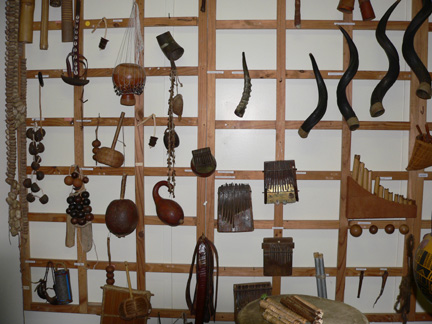
Andrew Tracey, Malawan Ulimba player, and students
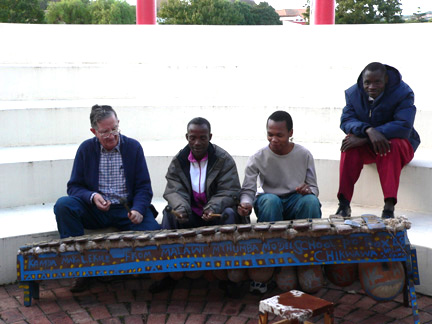 posted by D'Arcy Reynolds
3:41 AM
posted by D'Arcy Reynolds
3:41 AM
Concerts with the Sontonga Quartet
The next two concerts with Cloven Dreams are tonight in Grahamstown, and Sunday afternoon in Port Elizabeth. Then we'll be filming in Nieu-Bethesda during the week, and will have another concert next Saturday afrernoon, perhaps at the OwlHouse.
Sat 23 April 20:00
Beethoven Room, Grahamstown
Haydn Op. 77 no. 1
Reynolds Cloven Dreams
Schumann Piano Quintet with students from Rhodes University
Sun 24 April 16:00
UPE (University of Port Elizabeth) Auditorium
Port Elizabeth
Haydn Op. 77 no. 1
Peter Klatzow String Quartet no 3
Reynolds Cloven Dreams
Schumann String Quartet Op. 41 no.3
U C T C o n c e r t
The concert on 19 April at the University of Cape Town was attended by a warm mix of people affiliated with Owl House, students and faculty atUCT, the Jungian contingent, and those who heard our interview Sunday night on fine Music Radio (101.3). This concert was an 'all-Reynolds' concert performed by the Sontonga Quartet, Matthew Reid, clarinet, and the composeron the piano. The concert repertoire included the Preludes for viola and piano, Little Love Poem, Corazon del Verano for piano trio, Variations for Clarinet and piano, String Quartet, Cloven Dreams, 21 and Black Chinned Siskin for piano.
A moderated discussion followed the concert, and it turned out that there were people in the audience that grew up in the Karoo, near Helen Martins' Owl House. Mark Wilby, the curator of Owl House, and the documentary film crew for our upcoming film about Owl House were also there. This was a good time for everyone involved in the project to get a better feel for the music, and the corresponding imagery from Owl House.
Some of you may be wondering about the reference to the Jungians - there will be an international conference in Cape Town, August 2007 for the IAAP. We hope to present the documentary about the music inspired by Owl House at the conference.I'm also talking with someone at the National Gallery in Cape Town about their music program, also scheduled for 2007.
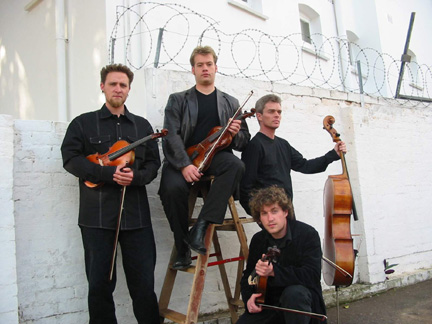 posted by D'Arcy Reynolds
3:34 AM
posted by D'Arcy Reynolds
3:34 AM
Sunday, April 10, 2005
Emerging
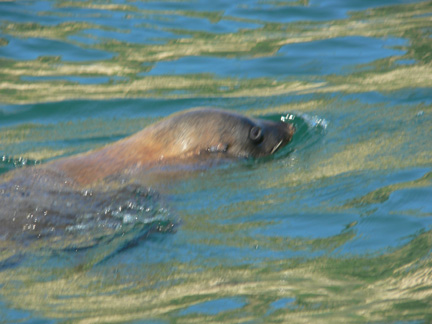 posted by D'Arcy Reynolds
8:05 AM
posted by D'Arcy Reynolds
8:05 AM
The fur seals were stunning, and abundant. They clustered on the rocky shores of a land mass on the north side of the bay that used to be part of the Faulklands. This is also where there had been early shipwrecks, and stories abound about the Portugese sailors that built small vessels out of theremains of their ship to return to Cape Town and Mozambique.
posted by D'Arcy Reynolds
8:03 AM
9 April, 2005
The shantytowns lie just outside of the more developed 'European' style cities and towns. The fishing boats in Plettenberg Bay provide 30% of the income for those living on the outskirts. The main fish here is Hake, a firm white fish, 80% of which is exported to Europe and served in restaurants within 48 hours of its capture in Plettenberg Bay.
The ecosystem of the waters around the towns of the Cape are carefully monitored. I have been gratified to see the level of awareness that people have about sustainability, reducing toxicity in the water, and maintaining a good balance between the various species that live in the area.
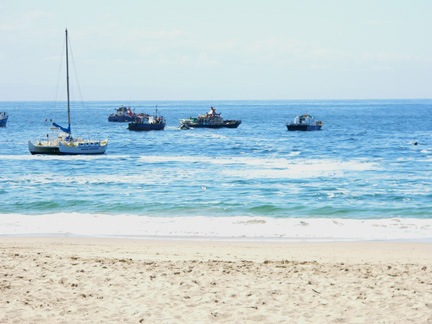 posted by D'Arcy Reynolds
7:58 AM
posted by D'Arcy Reynolds
7:58 AM
Saturday, April 09, 2005
Simons Town
Most of you have probably heard of Ladysmith Black Mambazo, and these singers had a similar sound, even singing a tune that is on one of my albums. The choral music is wonderful here, and there are a lot of groups that sing for tips in the tourist areas. It was hard to move on to lunch with this group singing such great music.
There was some lovely seafood at the restaurant in Simons Town. Kingklip is a nice solid white fish, often grilled or pan-fried in olive oil and garlic. The calamari was splendid - very delicate. I had the Salade Nicoise and Zenenblanc, but the tuna was a bit overdone. Brandy and Coke is a big drink in these parts, but I can say that it's not one that I would make a regular part of my diet... We were sated, and lulled into a peaceful sophorific state as we drove on to the Kirstenbosch Gardens.
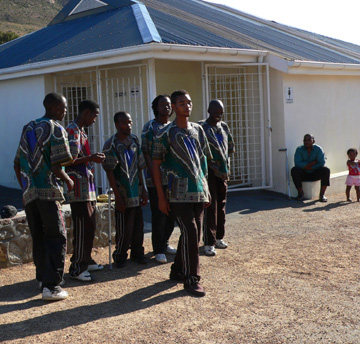 posted by D'Arcy Reynolds
9:52 AM
posted by D'Arcy Reynolds
9:52 AM
4 April Simons Town Penguins
Most people know my penchant for penguins, so the stop at the penguin colony at Simons Town was high on my list.... The penguins were originally called "Jackass Penguins" because their call resembles that of a donkey. Somewhere along the line, someone decided that they should have a more dignified name, and they are now called South African Penguins. They mate for life, and trade offcaring for their eggs and young. Many of the penguins were literally panting in the heat as they sat over their unhatched eggs. The area over their eyes becomes increasingly pink as they heat up. Their partner comes to relieve them so they can cool off in the water.
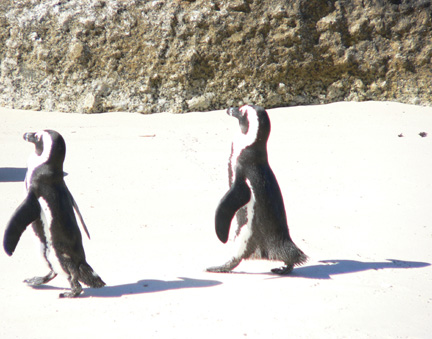 posted by D'Arcy Reynolds
9:49 AM
posted by D'Arcy Reynolds
9:49 AM
Constancia rehearsal
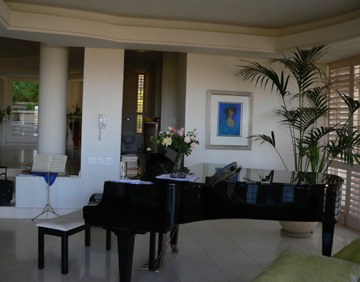 posted by D'Arcy Reynolds
9:48 AM
posted by D'Arcy Reynolds
9:48 AM
Constancia
The diversity in South Africa is stunning. Visit the townships one day, and the next to be ensconced in a palatial home in Constancia, followed by a concert given by a Dutch soprano, which segues to a reception in which Afrikaans is the principal language.
posted by D'Arcy Reynolds
9:47 AM
Ross Johnson laying down a new pattern
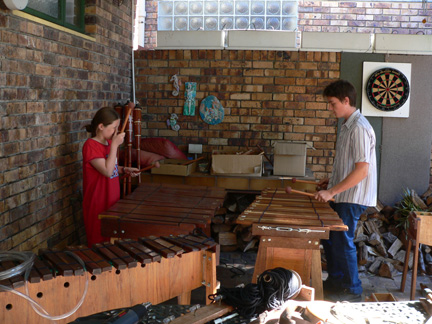 posted by D'Arcy Reynolds
9:45 AM
posted by D'Arcy Reynolds
9:45 AM
3 April Marimbas in action
It seems that I rehearse every other day, and explore the country on the alternate days. Hence, Sunday meant more meetings with musicians,and more rehearsing. I started off at the Johnson's home to talk about adding drums and marimba to Cloven Dreams for the UCT student performance that we are planning. We spent a bit of time working out some ideas, and then Ross uncovered two volumes on marimba patterns! What a find.... these are transcriptions of a lot of different African choral music.
I'm cooking up a sister-city concept between musicians in Cape Town and the San Francisco Bay area. This is something that Ross could participate in with his extensive marimba building, teaching, teacher-training projects that can be replicated anywhere in the world.
posted by D'Arcy Reynolds
9:42 AM
Township children
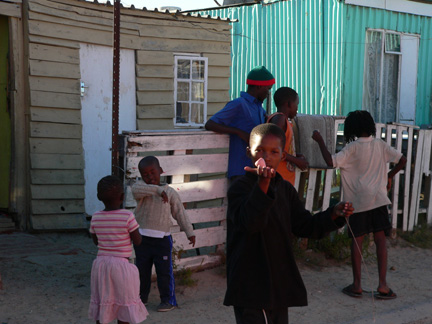 posted by D'Arcy Reynolds
9:41 AM
posted by D'Arcy Reynolds
9:41 AM
District 6 Map
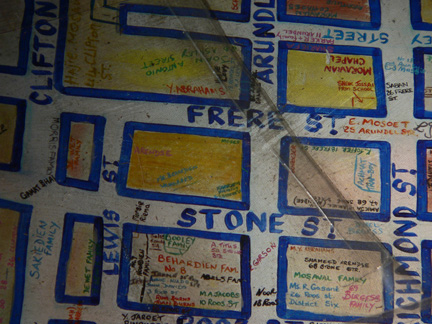 posted by D'Arcy Reynolds
9:38 AM
posted by D'Arcy Reynolds
9:38 AM
2 April Township Tour
The township tour was led by Nathi. He is a township resident, and gave an excellent and moving tour of the District 6 museum, District 6, and a few townships near Cape Town. The first photo shows a street map of District 6 that has been signed by the residents - it covers a good part of the first floor of the museum. Residents have contributed photos, street signs, memorabilia, letters, and stories to the museum. Nathi said that the viewpoint they have is to forgive, but not to forget the atrocities of the apartheid government.
In school, the township children are taught in English, but Lhosa is spoken at home, so most children are not bilingual. There are some good programs being created by the township communities. In Langa, there is a new community center where residents are taught trades, and the products such as pottery, sculpture, and musical instruments are sold. The music program at Langa includes piano, guitar, and traditional African music. Henry Lenares showed me the storage room that is filled with African percussion instruments and guitars. Every Saturday, the music teachers work with the children, and they are encouraged to come to the center on weekdays to practice.
posted by D'Arcy Reynolds
9:33 AM
Friday, April 01, 2005
Cape Town and Table Bay
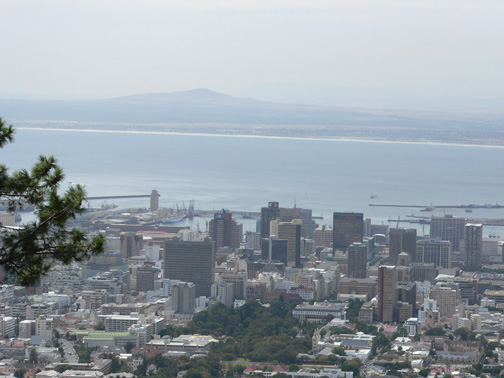 posted by D'Arcy Reynolds
9:13 AM
posted by D'Arcy Reynolds
9:13 AM
Ross Johnson center marimba, with dancer in foreground
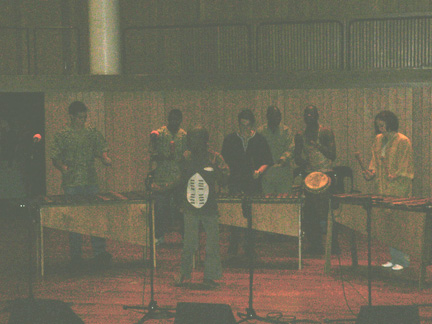 posted by D'Arcy Reynolds
9:03 AM
posted by D'Arcy Reynolds
9:03 AM
31 March, 2005
I've been to two African music concerts at UCT - one on Tuesday night, and another on Wednesday afternoon. These were both in Baxter Concert Hall, which boasts a Beckerathorgan, and seats 638. The Baxter Theatre Centre was completed in 1976, and is just below the building that houses the South African College of Music.
Dizu Plaatjies is a talented, and well-loved teacher in the African music program. In the two concerts, his students performed on a wide array of instruments, and were complemented by dance and vocals. Instruments included the mtshingo flute, akadinda, kudu horns, marimbas, and more. The mtshingo flute was played by Moeketsi Gibe, who deftly moved from his flute solo to drums in Bandigxohile:They Chase Me. They also had some vocals - Mamaliye: A song dedicated to all the mothers of the earth with Dizu on vocals, and other pieces had up to five vocalists with instrumental backing.
The South African music program has students from all over the world, and in the Wednesday afternoon concert, there were performer-couples from both Sweden and Canada.
I sat in on one of Dizu's drumming classes on Wednesday, and the techniques were reminiscent of Indian music.The students learn the strokes in conjunction with syllables, and then are able to swap out different patternsto create an improvisational sounding drumming pattern.
The students had write-ups of the vocalization of the patterns, and practiced the interlocking rhythms in sections, building and lengthening the rhythms. Dizu wouldadd new patterns along the way, showing students alternate patterns to add to the mix. Without a steady downbeatthe tempo tended to speed up and the rhythmic patterns would loose focus. So Dizu would have one person play thebass tone on the beat to keep it really tight.
One of the UCT students, Ross Anderson, is now in his third yearat UCT, and is the quintessential entrepreneur in his field. He has a double major in jazz on double bass, and Africanmusic on marimba, and his classical background is as a guitarist. He has developed a teacher training program for theAfrican schools on marimba, teaching students to become teachers, and transcribing a lot of the South Africanvocal music for marimba. He has a regular Monday night teacher training session that is open to the public. His students soon become teachers, and receive good compensation for their work. There are a lot of gigs that pay200-300 Rands for the students as well.
Greg Anderson (Ross's dad) has helped Ross to develop the infrastructure for his musical outreach program. This beganwhen Ross was only 15, and getting started as a rock musician. It is as though Ross is single-handedly carrying outthe mission of the new South Africa through education, teacher-training, and small business coaching for the African studentsthat he mentors. The juxtaposition and warmth between Ross and his African colleagues on stage is one of the more inspiring experiences that I've had since being in South Africa.
posted by D'Arcy Reynolds
8:55 AM
| |



